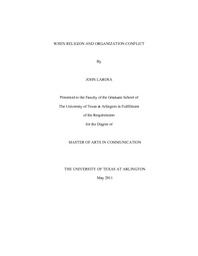| dc.contributor.author | LaRosa, John | en_US |
| dc.date.accessioned | 2011-10-11T20:48:03Z | |
| dc.date.available | 2011-10-11T20:48:03Z | |
| dc.date.issued | 2011-10-11 | |
| dc.date.submitted | January 2011 | en_US |
| dc.identifier.other | DISS-11060 | en_US |
| dc.identifier.uri | http://hdl.handle.net/10106/6137 | |
| dc.description.abstract | After the terrorist attacks of 9/11, the United States became a much different place to live and work for Muslim-Americans. Muslims are one of most discriminated, misunderstood, and feared groups in the US. This qualitative study used survey questionnaires to explore the potential role conflicts in the workplace faced by Muslim-Americans as they navigate their way through a post 9/11 world. In the workplace, Muslim-Americans are very aware of how they are viewed by other Muslims and non-Muslims alike. These views are considered when Muslim-Americans act and play a large role in what action and communication is selected. However it was noted that rather than role conflicts, Muslim-Americans appear to struggle more with role balancing and role ambiguity. Moreover, Muslim-Americans working in industries considered haraam are faced with a unique set of identity dilemmas and justification for their continued service in these fields was explored. | en_US |
| dc.description.sponsorship | Horton, Brian | en_US |
| dc.language.iso | en | en_US |
| dc.publisher | Communication | en_US |
| dc.title | When Religion And Organization Conflict | en_US |
| dc.type | M.A. | en_US |
| dc.contributor.committeeChair | Horton, Brian | en_US |
| dc.degree.department | Communication | en_US |
| dc.degree.discipline | Communication | en_US |
| dc.degree.grantor | University of Texas at Arlington | en_US |
| dc.degree.level | masters | en_US |
| dc.degree.name | M.A. | en_US |

